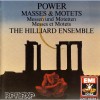| 国家: | 英格兰 |
| 期间: | Renaissance |
传记
Leonel Power (1370 to 1385 – 5 June 1445) was an English composer of the late Medieval and early Renaissance eras. Along with John Dunstaple, he was one of the major figures in English music in the early 15th century.[1][2]
Very little is known about Power's life. Documents dating from the early 1440s refer to him as a native of Kent. Stylistic analysis of his music, as well as his probable age during his known appointments, show that he may have been born between 1370 and 1385. A suggestion that Power was of Irish origin, which appeared in W.H.G. Flood's 1905 A History of Irish Music, is usually discounted by modern scholars, since Flood is not known to have had any other sources on Power's life than are currently available.[3]
The earliest dated reference to Power refers to him as instructor to the choristers of the household chapel of Thomas of Lancaster, 1st Duke of Clarence. The duke died in 1421; the next reference to Power is from 1423: on 14 May he joined the fraternity of Christ Church, Canterbury. He almost certainly served as choirmaster of the cathedral, and may also have been employed by John of Lancaster, 1st Duke of Bedford. He died at Canterbury on 5 June 1445 and was buried the next day; several notices of his death survive.
While Power's output was slightly less than Dunstaple's (only 40 extant pieces can be definitely attributed to him), his influence was similar. He is the composer best represented in the Old Hall Manuscript, one of the only undamaged sources of English music from the early 15th century (most manuscripts were destroyed during the Dissolution of the Monasteries in 1536-1540 under Henry VIII).
Power was one of the first composers to set separate movements of the Ordinary of the Mass which were thematically unified and intended for contiguous performance. The Old Hall Manuscript contains his mass based on the Marian antiphon, Alma Redemptoris Mater, in which the antiphon is stated literally in the tenor in each movement, unornamented. This is the only cyclic setting of the mass Ordinary which can be attributed to him.







